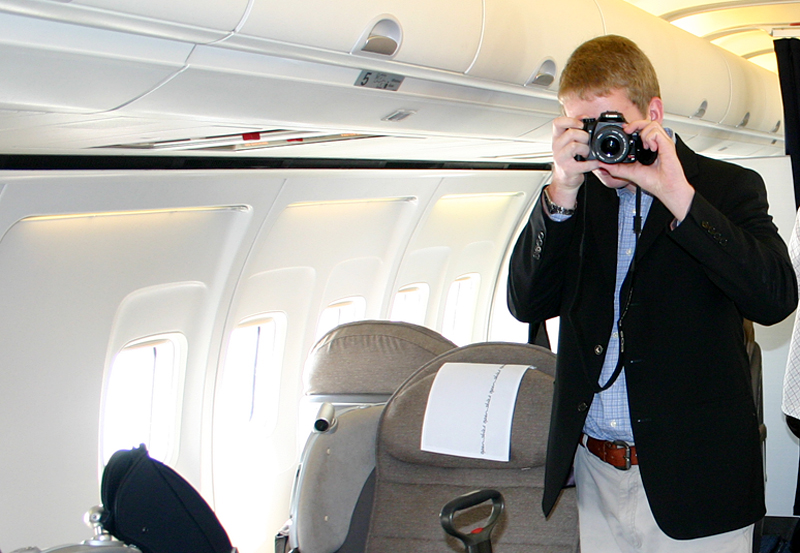F rom the office of the press secretary of the Department of Homeland Security of the United States earlier today comes an interim press release pertaining to the pending expansion on the ban of most electronics aboard airplanes on flights between Europe and the United States.
Interim Joint Statement on Pending Electronics Ban Expansion by Europe and the United States
The following text is the press release containing the interim announcement in its entirety:
BRUSSELS – Today, European Commissioner for Migration, Home Affairs and Citizenship, Dimitris Avramopoulos, and European Commissioner for Transport, Violeta Bulc, hosted a delegation from the United States in Brussels, led by Deputy Secretary of Homeland Security Elaine Duke, to discuss issues related to aviation security and safety.
At the meeting, both sides exchanged information on the serious evolving threats to aviation security and approaches to confronting such threats. Participants provided insight into existing aviation security standards and detection capabilities as well as recent security enhancements on both sides of the Atlantic related to large electronic devices placed in checked baggage.
The United States and the European Union reaffirmed their commitment to continue working closely together on aviation security generally, including meeting next week in Washington D.C. to further assess shared risks and solutions for protecting airline passengers, whilst ensuring the smooth functioning of global air travel.
Reaction to the Pending Expansion of the Electronics Ban
“It only takes a relatively small number of business travelers to stay home to make a flight unprofitable and consequently drive down demand for and yields on all Business and First Class seat sales”, Kevin Mitchell — who is the current chairman of the Business Travel Coalition — wrote in this open letter to Violeta Bulc. “There is evidence that this already is happening. Despite creative efforts by Gulf carriers such as gate-side check-in, separate secure inflight storage and dedicated arrival pick-up, not to mention onboard loaner tablets, early indications are the negative impact on bookings has been significant.”
Actually, use of the word ban with regard to the possible upcoming restrictions is really a misnomer. “The European electronics ban does nothing to stop terrorists from bringing explosives into planes to crash them. It also makes air travelers potentially less safe because it forces passengers to put their electronic devices, powered by lithium-ion batteries, in their checked luggage, which is stowed in the plane’s cargo hold”, according to this article written by Ned Levi of Travelers United. “The European electronics ban isn’t really a ban. It doesn’t actually keep electronic devices, with potentially secreted explosives in them, out of any plane. The ban merely relocates the electronics, which could potentially be bombs, from commercial aircraft cabins to their cargo holds.”
According to this article written by Christopher Jasper, Guy Johnson, and Marine Strauss of Bloomberg, the “widening of a U.S. ban on carrying electronic devices aboard aircraft to include flights from Europe would cost travelers more than $1 billion”, as estimated by the International Air Transport Association. “While existing curbs on some services from the Middle East and North Africa affect 350 U.S.-bound flights per week, extending it to the 28 European Union states plus Switzerland, Norway and Iceland would impact 390 a day, or more than 2,500 a week…That would cost passengers $655 million in lost productivity, $216 million for longer travel times, and $195 million for renting loaner devices on board.”
Summary
The aforementioned figures are some serious numbers which need to be considered. As I mentioned in this recent article pertaining to the alleged revealing of highly classified information to two representatives of the Russian government by Donald Trump — who is the current president of the United States — expanding the ban on most electronics to including flights between the United States and Europe “is like using nuclear weapons to kill a roach”.
I am vehemently opposed to the increased restrictions of not allowing passengers to carry aboard airplanes most electronics on flights between Europe and the United States.
I completely agree with the statement by Kevin Mitchell that “Simply put, the ripple effects of this could create an economic tsunami of the likes of which terrorists are dreaming of but instead it would be at the hand of government directive.”
How ironic…
Cameras are amongst the items which would not be permitted aboard airplanes on flights between Europe and the United States if the restrictions of most electronics in the passenger cabins aboard airplanes is expanded. Photograph ©2008 by Brian Cohen.

